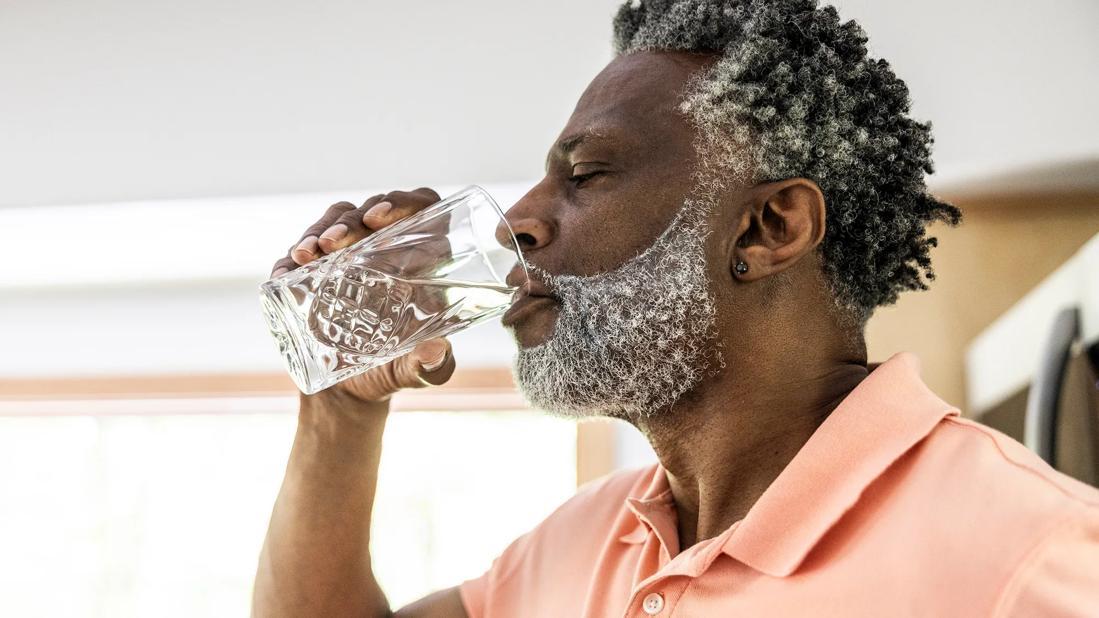Dehydrated? Here Are 8 Common Reasons Why
Not drinking enough, drinking too much at once and overdoing it on caffeine can all leave your body short on fluids

We all know it’s important to drink plenty of water. But what if you’re gulping the stuff down and still experience dehydration symptoms on a regular basis?
It could be a sign that something else is going on. Internal medicine specialist Kayla Rapp, DO, explains eight factors that may be influencing your fluid levels.
Reasons you’re dehydrated
There are many reasons you could be dehydrated. Some of them may surprise you — but not this first one!
1. You’re not drinking enough water
You may think you’re getting enough water each day. But it’s easy to come up short without realizing it. That’s because most people believe (incorrectly) that eight glasses are all we need.
The recommended daily amount is actually:
- 100 ounces/12.5 cups (3.1 liters) for men
- 73 ounces/9 cups (2.1 liters) for women
That’s a rough guideline. But how much water you need depends on ... well, you! It’s important to consider not only your sex, but also how active you are, how often you’re outside, how much you sweat, the food choices you make and more.
“A general rule of thumb is drink when you’re thirsty,” Dr. Rapp says.
But for some people, the sensation of thirst diminishes with age. Lack of thirst is also a common issue for young children.
If you rarely feel thirsty, consume at least the recommended daily amount of water a day, even if you don’t feel like you need it.
2. You have an electrolyte imbalance
Water is important. But it’s not enough.
“Water has hydrogen and oxygen,” Dr. Rapp explains. “But it doesn’t have the electrolytes your body needs.”
Electrolytes regulate the fluid levels in your cells, which means they’re key to maintaining proper hydration. They also help support blood flow, along with nerve, muscle and brain function.
You can get many electrolytes — like sodium, potassium, calcium and magnesium chloride — from the food you eat. In a pinch, try sports drinks and rehydration solutions instead.
3. You’re drinking too much water at once
If you chug a gallon of water each morning, you may be doing more harm than good.
When you overload your system with water, it gets rid of the excess when you pee. That wouldn’t be a problem, except that it takes precious electrolytes along for the ride.
Instead, aim to stay evenly hydrated throughout the day instead of trying to get it out of the way at one time.
4. You’re sweating
When you sweat, you lose fluids and electrolytes. Unless you replenish what you’ve lost, this can lead to dehydration.
Dr. Rapp reminds us that water, while essential, isn’t enough to keep you hydrated when you’ve been sweating up a storm. You also need to top up your electrolytes. It’s one of the many reasons orange slices are a go-to sports snack for little leaguers and pro athletes alike!
5. You’re drinking too much coffee or soda
While it’s tempting to count your morning cup of coffee as a glass of water — there’s water in it, after all — that’s not how hydration works. Several popular drinks have a diuretic effect. That means they can make you pee more, which can lead to dehydration. Examples include:
- Coffee
- Sodas
- Alcohol
- Energy drinks
6. You’re sick
Battling a bug? From the flu to food poisoning, illness is a common cause of dehydration. That’s because vomiting, sweating and diarrhea all rob you of fluids.
If you’re under the weather, make a point of sipping water and other clear liquids throughout the day. Spreading out your fluid intake makes it easier for your body to handle. Dr. Rapp recommends drinking electrolyte or sports drinks, tea and chicken broth.
“The beauty of chicken soup is that it has salt, which helps keep water in your body,” she adds.
7. You’re taking medication
Some medications cause dehydration. And that might be intentional: Diuretics, for example, are designed to remove excess water from your body.
Fluid loss can also be an unfortunate side effect of medications like:
If dehydration is listed as a side effect of a medication you take, it’s important to talk to your healthcare provider.
“If you have heart failure or issues with fluid retention, talk to your doctor about making a plan to keep you hydrated,” advises Dr. Rapp.
8. You have an underlying health issue
Dehydration deserves a conversation with your provider. It may be a sign of a more serious health condition.
Diabetes might be the first thing you think of. But there’s a long list of medical conditions — some acute, some chronic — that can cause dehydration. Examples include:
- Inflammatory bowel disease (IBD)
- Sjögren’s syndrome
- Cystic fibrosis
- Gastroenteritis
- Sepsis
- Addison’s disease
Dr. Rapp advises treating dehydration like you would any other symptom. If something changes (like your thirst level, your urine color or your fluid intake), let your provider know.
Final thoughts
Dehydration can happen for lots of different reasons. And yes, knowing the “why” is important. But before you worry about that, you need to hydrate. Your symptoms may improve within five to 10 minutes of drinking a glass of water.
If you’re experiencing signs of moderate or severe dehydration, seek medical treatment immediately. A healthcare provider can give you intravenous (IV) fluids and, if needed, run tests to determine why you’re dehydrated.